As the ship is slow, we spent time on the deck playing cards:
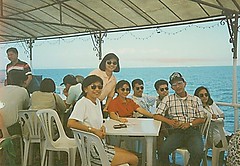
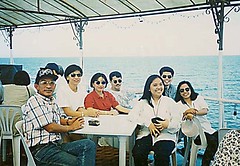
Watching the waves:
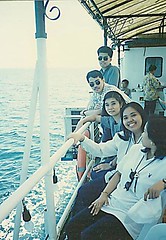
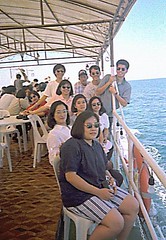
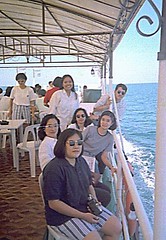
At the ship's prow:
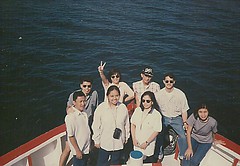
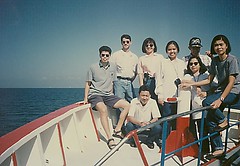
Corregidor Island in sight:
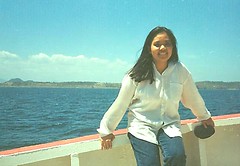
Sun Cruises has a faster boat and one can see that they overtook the Tennessee Walker:
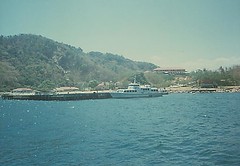 Corregidor is part of Cavite Province. It is remembered in history as the place where U.S. and Filipino soldiers holed out before surrendering to the invading Japanese Imperial Army during World War II.
Corregidor is part of Cavite Province. It is remembered in history as the place where U.S. and Filipino soldiers holed out before surrendering to the invading Japanese Imperial Army during World War II.- Other names for Corregidor are:
- The Island Fortress
- Fort Mills and
- The Rock
First stop is the Middleside Barracks.
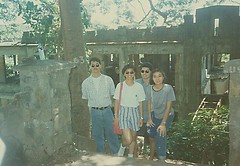
The Battery Way:
Battery Way was named in honor of 2nd Lt. Henry N. Way of the 4th U.S. Artillery who died in service in the Philippines in 1900.
There are four 12-inch mortars in Battery Way.
Peering through a 12-inch mortar. This picture was Dong's idea:
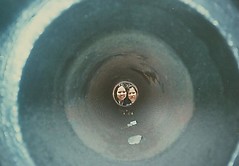
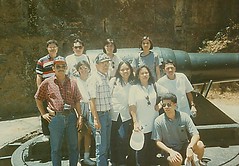
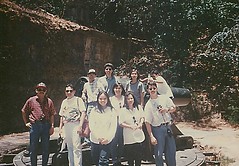
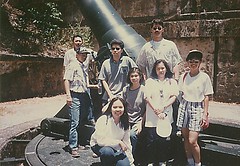
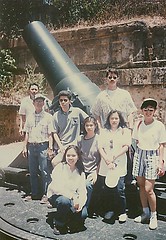
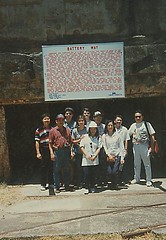
Battery Way proved to be one of the best and most effective gun emplacements to defend Corregidor during the Japanese siege.
Battery Hearn is a 12-inch seacoast west-ranged gun:
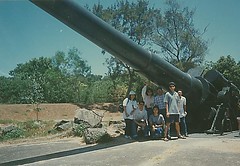
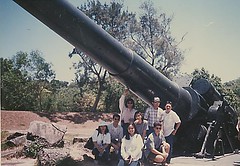
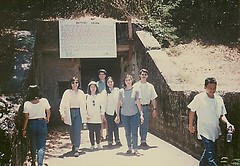
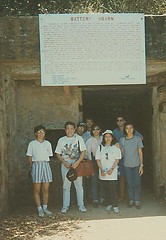 Battery Hearn is one of the major defense systems of Corregidor. However, Battert Hearn did not see action during World War II because it face the South China Sea. The Japanese came from the opposite direction.
Battery Hearn is one of the major defense systems of Corregidor. However, Battert Hearn did not see action during World War II because it face the South China Sea. The Japanese came from the opposite direction.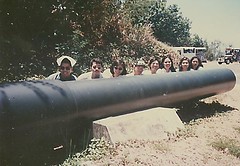 Battery Path earned its name because a gun lies along the path. It leads to Battery Wheeler. A direct hit threw this gun out of the Battery.
Battery Path earned its name because a gun lies along the path. It leads to Battery Wheeler. A direct hit threw this gun out of the Battery.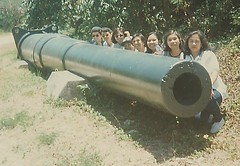 The only way we could include the whole gun in the picture without us ending up too small is to squat ... therefore here we are pretending to hide from an enemy.
The only way we could include the whole gun in the picture without us ending up too small is to squat ... therefore here we are pretending to hide from an enemy.Topside: Mile-Long Barracks had the distinction of being the world's longest military barracks. Its actual length is less than 1/3 of a mile:
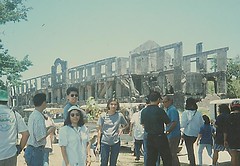
Cine Corregidor is the movie theater that provided entertainment for the soldiers and their families:
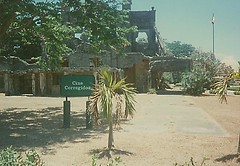
The Pacific War Memorial:
The Pacific War Memorial Museum is small and contains relics, photographs, and military papers from the Second World War.
Loading an infantry mortar with mineral water bottles. Water torture?
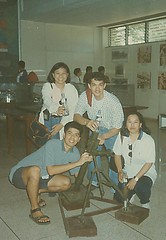
Posing with a medium machine gun.
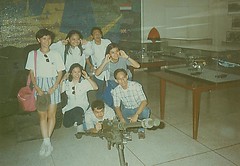
At the back is a world map mosaic detailing the movements of the Allied and Axis forces during World War II. Notice the bomb near the map. The tables showcase models of aircraft used during the war.
A bus that looks like a tranvia - the trams that served as commuter buses in old, pre-war Manila.
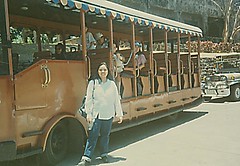
We didn't ride these, though as this is for clients of Sun Cruises. We rode the jeep parked behind the bus.
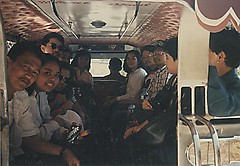
In front of Gen. Douglas MacArthur's 1936 Cadillac Series 90 V16 limousine.
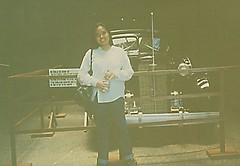
Only two such cadillacs were built in 1936 and only Gen. MacArthur's restored car is the only one still running today.
The 3D map of Corregidor Island... and no, the person beside me is not a Japanese straggler:
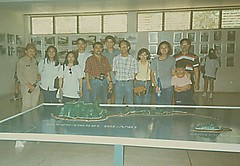
Here we see Dong's fixation with sex. Any psychiatrist around to help? He he he!
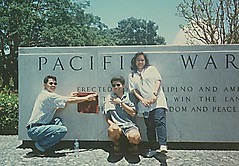
Seriously now...
The Pacific War Memorial is erected to the Filipino and American fighting men who gave their lives to win the land, sea and air victories which restored freedom and peace to the Pacific Ocean area.
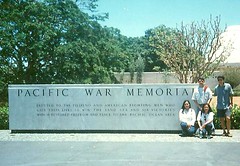
Inside the Pacific War Memorial:
Sleep my sons, your duty done ... for freedom's light has come
Sleep in the silent depths of the sea, or in your bed of hallowed sod
Until you hear at dawn the low, clear reveille of God
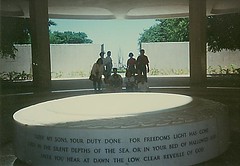
Under the huge white dome is a round white slab of stone. The dome has a hole in the top middle where sunlight passes through to hit the top of the slab. Notice the Eternal Flame of Freedom is seen through the passage.
V formation! Clowning outside the memorial dome.
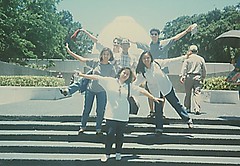
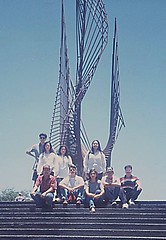 The Eternal Flame of Freedom is a steel structure designed by Greek-American architect Aristides Demetrios.
The Eternal Flame of Freedom is a steel structure designed by Greek-American architect Aristides Demetrios.The Malinta Tunnel Light and Sound Presentation:
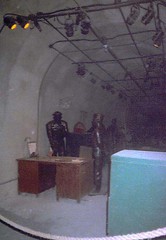 Men and women lived and worked in the Malinta Tunnel during the siege of Corregidor. Command communications and medical units were located here. The USAFFE Headquarters of General Douglas MacArthur was housed in one of the laterals of the tunnel.
Men and women lived and worked in the Malinta Tunnel during the siege of Corregidor. Command communications and medical units were located here. The USAFFE Headquarters of General Douglas MacArthur was housed in one of the laterals of the tunnel.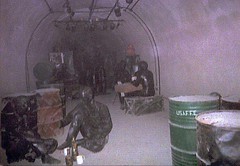 The entire length of the main tunnel was lined with crates of all sizes and descriptions. Dug through solid rock, the tunnel offered complete protection from artillery or air attack. Although safe inside, the morale of the personnel was low.
The entire length of the main tunnel was lined with crates of all sizes and descriptions. Dug through solid rock, the tunnel offered complete protection from artillery or air attack. Although safe inside, the morale of the personnel was low.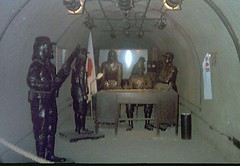 Once they had occupied Corregidor, the Japanese used the fort to their advantage. When the American forces returned to recapture Corregidor, the trapped Japanese soldiers committed suicide by blowing themselves up in one of the laterals of Malinta tunnel. A ghost is said to haunt the tunnel, although it is not clear whether it is the ghost of a Japanese, Filipino, or American soldier.
Once they had occupied Corregidor, the Japanese used the fort to their advantage. When the American forces returned to recapture Corregidor, the trapped Japanese soldiers committed suicide by blowing themselves up in one of the laterals of Malinta tunnel. A ghost is said to haunt the tunnel, although it is not clear whether it is the ghost of a Japanese, Filipino, or American soldier.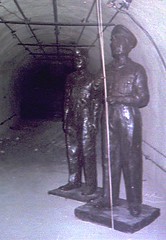 The US flag was raised once more in Corregidor by General MacArthur on March 2, 1945. It was almost three years since MacArthur was forced to flee the fort on March 12, 1942.
The US flag was raised once more in Corregidor by General MacArthur on March 2, 1945. It was almost three years since MacArthur was forced to flee the fort on March 12, 1942.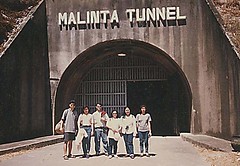 Leaving the tunnel. The "Malinta Experience" was scripted by National Artist and film director Lamberto Avellana. The scupltures were made by Napoleon Abueva, another National Artist.
Leaving the tunnel. The "Malinta Experience" was scripted by National Artist and film director Lamberto Avellana. The scupltures were made by Napoleon Abueva, another National Artist.On the way back to Manila Hotel. This is a picture of the Tennessee Walker's dining area:
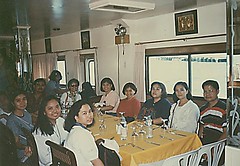
For more information on the history of Corregidor and World War II, click the following links:
PBS' The American Experience: MacArthur - Special Features: The Fight in the Philipines:
http://www.pbs.org/wgbh/amex/macarthur/sfeature/bataan.html
World War II History Info: The Fall of the Philippines, Bataan and Corregidor:
http://www.worldwar2history.info/Bataan
http://www.worldwar2history.info/Bataan
http://corregidor.org/ghq.htm


